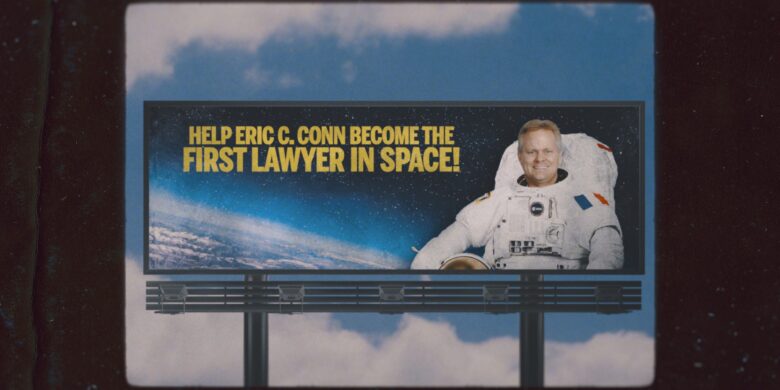Apple TV+’s latest documentary series The Big Conn is a too-earnest, too-cute look at the biggest scandal to ever hit the Social Security Administration.
The story is fascinating and filled with interesting people. But the approach taken represents the very worst tendencies of modern nonfiction. That includes its four-episode run time, which could easily have been tightened to a single movie.
Ultimately, there’s something a little crass about making a documentary about fraud that jukes every scene until it’s two minutes too long, just to make sure it meets a series order.
The Big Conn review
In 2011, a Social Security lawyer named Eric C. Conn and a judge named David Daugherty were investigated for committing massive fraud over many years. Conn, a dilettante and would-be Howard Roark, figured out that he would get paid a hefty retainer for every Social Security disability payment he managed to get approved, so he and Daugherty (who need quick cash to pay for his daughter’s upcoming narcotics trial – which presumably meant bribing an awful lot of people) came to an arrangement.
If they just approved every single claimant, without taking the time and resources to hold hearings, they’d turn on the money faucet and maybe even become heroic in the eyes of the people they were helping.
Of course, when you’re submitting thousands more claimants than any other district in the country, it slows down the progress of every other claimant. A reporter for The Wall Street Journal, Damien Paletta, started doing a little research about the White House budget and saw the outrageous approval ratings coming out of Daugherty’s office and flew down to Pikeville, Kentucky, to meet him.
The judge dodged him. But Paletta managed to track down proof that most of the claims Daugherty was forwarding to the Social Security Administration for payment were being investigated by Conn. Conn, in turn, would send Daugherty’s upcoming claimants to a quack doctor, who’d sign off on misdiagnoses.
Living large in Kentucky

Photo: Apple TV+
Conn became a local celebrity. He put up billboards all over the county and ran ubiquitous TV commercials. His parties were legendary, and his 16 marriages were the talk of the town.
He flooded his corner of Kentucky with money, bought mansions and fancy cars and watches. He even opened a brothel, and took monthly vacations to exotic locations as a sex tourist.
Conn became a laughingstock as a legitimate lawyer (taken off his first case by a judge who noticed he had no idea what he was doing). And the frustrating part is that, if Paletta’s story had never made the front page of The Wall Street Journal, Conn probably still would be scheming people.
Jennifer Griffith and Sarah Carver were working for the Disability Administration and noticed all this corruption firsthand. They wrote to the Social Security Administration, wrote to lawyers, wrote to the president of the United States. But nothing ever came of their complaints until the WSJ story broke. Then, with national attention brought to Conn, the Senate, the FBI and the SSA (who’d been enabling the fraud the whole time) finally stepped in.
Of course, the story was far from over.
The curse of the ugly documentary
Being a critic of the moving image is a frequently frustrating gig because you have to be aware of the precipitous decline in care afforded the image. I’ve talked before about how documentaries are at an all-time nadir, and there isn’t a single root cause.
People like stories about grifters and frauds. Increased demand can be met with fervent and careless supply. And streamers can apparently just keeping buying these bloated miniseries without taking a hit.
The trouble here is that there is no template for delivery of nonfiction, so every story chosen haphazardly to get the many-hour quirky TV doc treatment is given the same gift bag of techniques.
In The Big Conn, we have clips from movies meant to rhyme with the action described. We see Errol Morris-style re-enactments of scenes described by the interviewees (starring the interviewees in some case). And we hear pop music on the soundtrack along with an original score.
As the series grinds on, we endure talking head interviews, phone interviews and footage shot by the filmmakers of incidental material. We also see newspaper clippings, footage from broadcasts and YouTube videos. We even hear Conn’s diaries read by Boyd Holbrook.
In short, the series’ creators hit us with everything but the kitchen sink. It’s the TGI Friday’s approach to nonfiction — we get so much clutter lying around in place of a legitimate theme or personality.
The trouble with re-enactments
The real problem is the re-enactments. They’re interminable and add nothing. A scene of the Conn employees burning evidence feels endless, and there’s nothing you’ll gain in minute three of the sequence that you couldn’t have gotten from the testimony of the guy who showed them where they burned everything. Showing us one shot after another of papers and files going into a big bonfire contributes absolutely nothing.
There’s also something incredibly silly about asking the finance editor of The Wall Street Journal to sit and re-enact the time he saw a play starring Daugherty, which consists of him pulling his hat down over his eyes and looking nervous in a chair. These were images any audience member would have been able to conjure just fine without the help of the sight of journalist Paletta doing them as he describes them.
I found Paletta a troubling presence. He seems to believe Conn had a vendetta against him because he was the one who got the ball rolling on the fraud investigation. Paletta rather ludicrously asserts that he viewed one of Conn’s post-hearing commercials as a personal attack — and the filmmakers let him do it.
A parade of yahoos and fools
The reason I find that all too much is that Conn and his cronies weren’t serious people. Conn had a bodyguard named Curtis Wyatt who threatened to kill Paletta after his first visit to Conn’s law offices. But the thing is, Wyatt threatened to kill everyone who posed even a mild threat to Conn because he was a psychopath and a moron.
David Kirk, one of Conn’s former associates, compares Wyatt to Dwight Schrute from The Office, which takes a little of the sting out of his menace. Even if Wyatt did own a lot of guns, Conn wasn’t stupid enough to let this yahoo loose on his enemies. He was still afraid of his own mother.
That’s the issue, as well. Conn is a lot more interesting on paper than he is on screen. He looks like a recessive and sickly mix of Chuck Connors and Brian Dennehy. The scheme to defraud the SSA wasn’t even his idea. Conn went along with Daugherty’s plan, because the judge needed money to pay off people in his daughter’s crack arrest trial.
Conn was happy to keep living the high life because he believed no one would ever catch him. In the phone calls the directors record with him, Conn exhibits a lunatic intensity, but none of the charisma people attribute to him.
There’s something extremely odd about watching a four-hour documentary about someone and getting absolutely no communicable sense of his appeal. By the time Conn’s emailing the police and his lawyers from safe houses in Honduras, it’s clear he’s just a garden-variety sociopath. He liked attention and paid handsomely to get it.
Lipstick on a pig

Photo: Apple TV+
The filmmakers do themselves no favors by constantly making textual references to other movies, because, try as they might, there’s no way to make this story interesting enough to fill four hours of screen time. So they try to make you think you’re watching something more cinematic. For instance, they play “Little Green Bag” by the George Baker Trio — the song from the opening of Reservoir Dogs — over footage of investigators storming the disability office looking for Daugherty.
Similarly, every time someone mentions Scooby Doo, we see clips from the cartoon.
Then, after all these hours of Dukes of Hazzard-style “Can you believe this?!?” wackiness, we see the heartbreaking interviews with people Conn defrauded. They talk about how the Social Security Administration is gouging them for thousands because they were caught up in Conn’s scheme.
Lives were ruined. People killed themselves. I’m less interested in the madcap adventures of Eric Conn than I am in actually paying undivided attention to people getting killed by their government while they languish and their families go hungry.
I will say this, though. The Big Conn was worth watching just to spend time with Mason Tackett, a rapper and Kentucky local who had some dealings with the scammer. He’s an incredible interview — funny and earnest and good-natured.
Tackett is a gold mine of funny sayings and hypotheticals. I could have watched a whole movie about him. Eric C. Conn, on the other hand …
Watch The Big Conn on Apple TV+
All four episodes of The Big Conn are now streaming on Apple TV+.
Rated: TV-MA
Watch on: Apple TV+
Scout Tafoya is a film and TV critic, director and creator of the long-running video essay series The Unloved for RogerEbert.com. He has written for The Village Voice, Film Comment, The Los Angeles Review of Books and Nylon Magazine. He is the author of Cinemaphagy: On the Psychedelic Classical Form of Tobe Hooper, the director of 25 feature films, and the director and editor of more than 300 video essays, which can be found at Patreon.com/honorszombie.
![The Big Conn falls for the modern documentary scam [Apple TV+ review] The Big Conn review: Intrepid journalist Damian Paletta uncovered a gigantic Social Security scam.](https://www.cultofmac.com/wp-content/uploads/2022/05/The_Big_Conn_Photo_010102-1536x768.jpeg)

